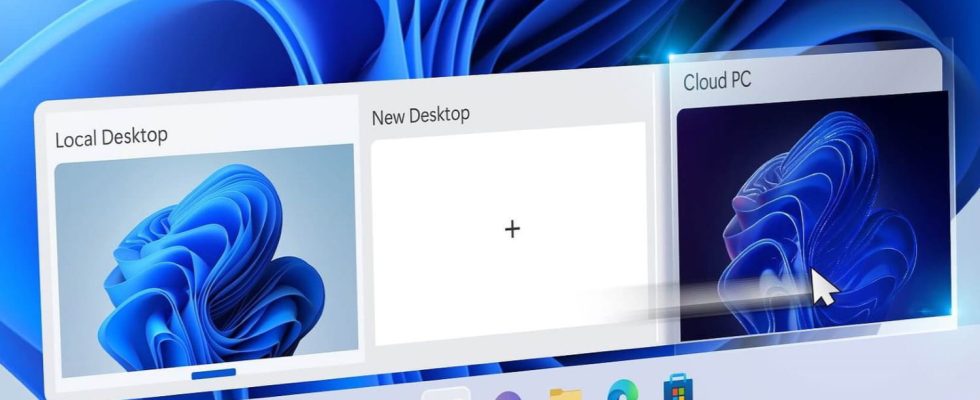Microsoft is preparing a consumer version of Windows 365, its virtual PC service in the cloud with Windows 11, accessible from any device connected to the Internet, thanks to a subscription. Good or bad idea ?
What if Windows was now offered as a subscription? As curious as the question may seem at first sight, it has nothing to do with a school hypothesis. Not only is the idea gaining ground at Microsoft, but above all, the publisher has already made it a reality with its Windows 365 offer, a formula intended for companies for the moment and which could be available in a consumer version from the fall of 2023. , according to the predictions of Windows Latest, a specialized site always well informed. A perspective that raises many questions about its implementation as well as its interest, by inducing a complete paradigm shift. Because who says subscription, says perpetual payment, which is not the case of the economic model adopted by Microsoft since the beginning of Windows…
Windows 365: Cloud Computing for everyone
To fully understand what is going on, it is necessary to return to the principle of Windows 365. This service is not new: it has existed since 2020. But it has since been reserved for companies through two formulas called Windows 365 Business and Windows 365 Enterprise, billed from 31 to 67 euros per month depending on the configuration chosen. In fact, and this is essential, Windows 365 is not a version of Windows on subscription, as one might even think, but a complete Cloud Computing service, like what the Frenchman offers Shadow (see our article). Clearly, it gives access, through a subscription, to a virtual PC that can be used via the Internet. And this, from almost any connected device.
In practice, all you have to do is connect to the service using an account – Microsoft of course… –, choose a subscription plan, then select a configuration according to your needs to use a remote computer under Windows 11, controlling it with a keyboard, mouse and screen. The idea is that everything is done remotely, in cloud mode, on the virtual PC hosted by Microsoft’s servers: the only information that passes through are the commands (text entered, actions on the mouse, etc.) and the display, which streamed, much like a Netflix video. The device used does not need to be powerful since everything is remote: the applications run on the virtual PC, which performs all the calculations and all the processing, and which stores all the files on the servers. This is why we can, in theory, control it with a tablet or a smartphone, even if a computer seems more appropriate in the case of Windows.
Windows 365: configurations on demand
The advantages put forward by Microsoft are numerous. Apart from the fact that it is not necessary to have a powerful machine to use a virtual PC, the apps and files it stores remain accessible from anywhere via an Internet connection, just like the data stored in OneDrive. No need to bother with updates and other security procedures either, since they are automatically managed by Microsoft on the virtual PC. Finally, it is very easy to upgrade the remote computer according to your needs by choosing a new configuration: enough, in principle, to enjoy the equivalent of a PC gamer from an entry-level machine, without having to invest in expensive components.
Currently, Microsoft offers three configurations in its professional formulas, with 2 or 4 virtual processors, 4, 8 or 16 GB of RAM and 128 GB of storage. We do not know the publisher’s plans for its future consumer version, but we can imagine more muscular configurations with more storage or a real GPU to run games. Similarly, nothing is known about the proposed tariffs either. But Windows Latest expects a basic price equivalent to ten euros per month. Of course, it is easy to imagine that the Redmond firm will offer an offer coupled with Microsoft 365, its office suite in cloud mode, for complete turnkey family use.
Windows 365: renting vs buying
Difficult for as much to know if this innovative concept, which undoubtedly prefigures a certain future of data processing, will be able to really convince private individuals. On the one hand, there is the problem of the location of data, which not everyone wants to leave on the servers of a commercial company, which is essentially private. On the other hand, there is the question of cost. Even at 10 euros per month, or 120 euros per year, is it more profitable to rent a virtual computer than to buy one, even a very modest one. Especially since once the subscription is terminated, you can obviously no longer use the virtual PC. And that you need a device anyway to use the service. In short, as for housing, it is the eternal debate between renting and buying. Not sure that the mentalities of current PC users are ready to adopt this new model… One thing seems certain, however: the arrival of Windows 365 in the consumer sphere will not signal the end of local and definitive Windows as we know. Everyone should be able to continue using a classic PC for many years.

